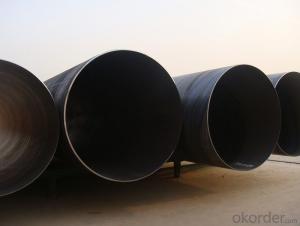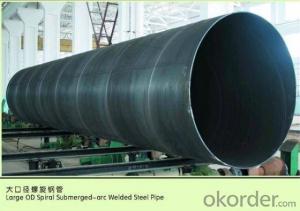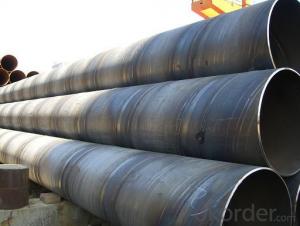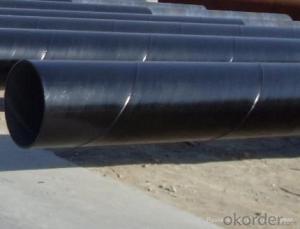SPIRAL STEEL PIPE 58‘‘ ASTM API LARGE DIAMETER PIPE
- Loading Port:
- Tianjin
- Payment Terms:
- TT OR LC
- Min Order Qty:
- 5 m.t.
- Supply Capability:
- 3000 m.t./month
OKorder Service Pledge
OKorder Financial Service
You Might Also Like
Packaging & Delivery
Packaging Detail: | standard export packing or as customer's requirement |
Delivery Detail: | within 10 - 30 days |
Specifications
Spiral Welded Steel Pipes and Tubes
1.Material:Q195-Q235
2.Length:1-12m
3.WT:1.0-14mm
4.O.D.:20-273mm
Spiral Welded Steel Pipes and Tubes
Product Description:
1.Material : Q235,Q345,L245,L290,L360,L415,L450,L485,GrB,X42,46,X52,X56,X60,X65,X70,X80,X100
2,Standard: SY/T5037-2000,GB/T9711-2011,API Spec 5L PSL1/PSL2,ASTM A252\A53,ISO3183,DIN17172,EN10217,JIS G3457,AWWA C200,ASTM A139,ASTM A671,ASTM A672
3.Wall thickness: 3.0mm-30mm
4.Outer diameter: φ168mm-3020mm
5,Length: 5m-12m or as your requirement
6,Corrosion protection standard: DIN30670,DIN30671, AWWAC210, AWWA C203, SY/T0413-2002,SY/T0414-2002
7,Application: Oil, gas, natural gas, water pipe, thermal electricity pipe, steel structure engineering, etc
Q195-q345 Material Steel Pipe's Materials
Elements | Chemical Compsition% | Mechanical Property | ||||||
C% | Mn% | S% | P% | Si% | Yield Point (Mpa) | Tensile Strength(Mpa) | Elongation | |
Q195 | 0.06-0.12 | 0.25-0.50 | <0.050< span=""> | <0.045< span=""> | <0.030< span=""> | >195 | 315-430 | 32-33 |
Q215 | 0.09-0.15 | 0.25-0.55 | <0.05< span=""> | <0.045< span=""> | <0.030< span=""> | >215 | 335-450 | 26-31 |
Q235 | 0.12-0.20 | 0.30-0.70 | <0.045< span=""> | <0.045< span=""> | <0.030< span=""> | >235 | 375-500 | 24-26 |
Q345 | <0.20< span=""> | 1.0-1.6 | <0.040< span=""> | <0.040< span=""> | <0.55< span=""> | >345 | 470-630 | 21-22 |
- Q:How are steel pipes used in the construction of biomass power plants?
- Steel pipes are used in the construction of biomass power plants for various purposes, including transporting and distributing steam, water, and other fluids throughout the facility. They are also used for the construction of boiler systems, as well as for conveying fuel and exhaust gases. In addition, steel pipes are essential for the structural integrity of the plant, providing support and durability in various applications.
- Q:What is the role of steel pipes in the construction of stadiums?
- Steel pipes play a crucial role in the construction of stadiums as they are used for various purposes such as structural support, framing, and the creation of plumbing and drainage systems. These pipes provide the necessary strength and durability required to withstand heavy loads, ensuring the overall stability and safety of the stadium structure. Additionally, steel pipes are also used for the installation of HVAC systems, electrical wiring, and other infrastructure components, making them an essential element in the construction process.
- Q:What is the difference between steel pipes and PEX pipes?
- The main difference between steel pipes and PEX pipes lies in their material composition. Steel pipes are made of rigid metal and are typically used for industrial applications, while PEX pipes are made of flexible plastic and are commonly used for residential plumbing systems. Steel pipes offer durability and strength, but can be prone to corrosion. PEX pipes, on the other hand, are corrosion-resistant and easier to install due to their flexibility. Additionally, PEX pipes have better insulation properties and are less likely to burst in freezing temperatures compared to steel pipes.
- Q:What are the different methods of wrapping steel pipes for corrosion protection?
- There are several methods used for wrapping steel pipes to provide corrosion protection. These methods include the use of tapes, shrink sleeves, liquid coatings, and powder coatings. Each method has its advantages and disadvantages, and the choice of wrapping method depends on factors such as the environment, the required level of protection, and the budget.
- Q:D108*4 what does "D108" mean by seamless steel tubes? What does "*4" mean?
- Seamless steel pipe: a pipe with a hollow cross section, used as a conduit for transporting fluids, such as pipelines for transporting petroleum, natural gas, gas, water, and certain solid materials. Compared withsteel and roundsteelinsolid, flexural torsional strength in the same time, the weight is light, is a kind of economic section steel, widely used in the manufacture of structural parts and mechanical parts, such as the oil pipe, automobile transmission shaft, the bicycle frame and steel construction with scaffold with steel pipe manufacturing ring parts can be improved the utilization rate of materials, simplify the manufacturing process, material saving and working hours, has been widely used to manufacture steel tube.
- Q:How are steel pipes used in the power generation sector?
- Steel pipes are commonly used in the power generation sector for various applications such as transporting steam, water, and other fluids within power plants. They are used for conveying fuel and combustion gases, as well as for cooling systems and turbine installations. Additionally, steel pipes are utilized in power plant construction for structural support and as part of the overall infrastructure.
- Q:What's the gate number of the precision steel pipe?
- Precision steel pipe refers to the high precision steel pipe, the wall thickness and internal and external diameter can be controlled within 10 wire tolerance range
- Q:Can steel pipes be used for conveying solids?
- Yes, steel pipes can be used for conveying solids. Steel pipes are commonly used in various industries to transport solid materials such as ores, minerals, grains, and other bulk materials. They are durable, resistant to high pressure and temperature, and have a smooth interior surface that allows for efficient flow of solids.
- Q:What is the difference between carbon steel and cast iron pipes?
- Various industries widely use carbon steel and cast iron pipes for different purposes. The composition and properties of these two types of pipes distinguish them from each other. 1. In terms of composition, carbon steel pipes consist mainly of iron and carbon, with trace amounts of manganese, phosphorus, sulfur, and other elements. In contrast, cast iron pipes are created by melting iron and adding a small percentage of carbon, typically ranging from 2-4%. 2. When it comes to strength and durability, carbon steel pipes generally outperform cast iron pipes. Carbon steel possesses a higher tensile strength, enabling it to handle greater pressures and reducing the likelihood of damage or deformation. On the other hand, cast iron, while strong, is more brittle and prone to cracking. 3. Carbon steel pipes necessitate additional coatings or treatments to safeguard them against corrosion. If not properly protected, these pipes can be vulnerable to rust and corrosion, particularly when exposed to moisture or corrosive substances. Conversely, cast iron pipes have inherent corrosion resistance due to the formation of a protective layer of iron oxide (rust) on their surface. 4. Cast iron pipes are typically heavier than carbon steel pipes, making them more challenging to handle and install. Comparatively, carbon steel pipes are lighter, facilitating easier transportation and installation. 5. Cast iron pipes excel in sound-dampening properties, resulting in quieter fluid flow. Conversely, carbon steel pipes tend to transmit more noise and vibrations. 6. In terms of cost, cast iron pipes generally carry a higher price tag than carbon steel pipes due to additional manufacturing processes and the increased cost of raw materials. In conclusion, the distinctions between carbon steel and cast iron pipes encompass their composition, strength, corrosion resistance, weight, noise transmission, and cost. The choice between the two relies on the specific application, budgetary considerations, and environmental factors.
- Q:How are steel pipes used in the agriculture sector?
- Steel pipes are commonly used in the agriculture sector for various purposes, such as irrigation systems, drainage systems, and structural support for farm buildings and infrastructure. They are also used for conveying water, chemicals, and other fluids, as well as for constructing fencing and livestock enclosures. Moreover, steel pipes are utilized in the construction of machinery and equipment essential for farming operations.
1. Manufacturer Overview |
|
|---|---|
| Location | |
| Year Established | |
| Annual Output Value | |
| Main Markets | |
| Company Certifications | |
2. Manufacturer Certificates |
|
|---|---|
| a) Certification Name | |
| Range | |
| Reference | |
| Validity Period | |
3. Manufacturer Capability |
|
|---|---|
| a)Trade Capacity | |
| Nearest Port | |
| Export Percentage | |
| No.of Employees in Trade Department | |
| Language Spoken: | |
| b)Factory Information | |
| Factory Size: | |
| No. of Production Lines | |
| Contract Manufacturing | |
| Product Price Range | |
Send your message to us
SPIRAL STEEL PIPE 58‘‘ ASTM API LARGE DIAMETER PIPE
- Loading Port:
- Tianjin
- Payment Terms:
- TT OR LC
- Min Order Qty:
- 5 m.t.
- Supply Capability:
- 3000 m.t./month
OKorder Service Pledge
OKorder Financial Service
Similar products
New products
Hot products
Related keywords






























